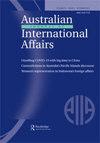联合国支持、东盟领导的缅甸问题谈判
IF 1.8
3区 社会学
Q2 INTERNATIONAL RELATIONS
引用次数: 0
摘要
摘要缅甸军事政变未遂两年后,局势陷入僵局。与2021年4月被誉为重大突破的东盟五点共识相比,进展甚微。侵犯人权的行为仍在继续,据报道,军方正在节节败退,但几乎没有谈判的意愿。面对内部政治制约,东盟请求联合国给予支持。安理会的回应是“鼓励国际社会”支持东盟解决危机。联合国缅甸问题特使宣布,没有“谈一谈”的空间,她将专注于减轻痛苦。这篇评论认为联合国应该做得更多。它回顾了秘书长2017年对“外交促进和平”的优先考虑,以及他对联合国调解能力的雄心。它审查了秘书长通过其特使和代表进行“斡旋”的其他情况,并指出,秘书长进行斡旋通常是根据安全理事会的请求。因此,本评论探讨了东盟提出这一请求的可能性,以期促使联合国更加支持东盟领导的缅甸政治解决谈判。本文章由计算机程序翻译,如有差异,请以英文原文为准。
The case for UN-supported, ASEAN-led negotiations on Myanmar
ABSTRACT
Two years following Myanmar’s attempted military coup, the situation is at a stalemate. Little progress has been achieved against ASEAN’s Five Point Consensus, hailed as a major breakthrough in April 2021. Egregious human rights violations continue, and the military is reportedly losing ground but showing little inclination to negotiate. Facing internal political constraints, ASEAN has requested support from the UN. The Security Council has responded by ‘encouraging the international community’ to support ASEAN to resolve the crisis. The UN’s Special Envoy on Myanmar has for her part declared there is no room for ‘talks about talks’, and that she will focus on alleviating suffering. This commentary argues that the UN should do more. It recalls the Secretary-General’s prioritisation in 2017 of ‘diplomacy for peace’, and his ambitions for the UN’s mediation capacity. It reviews situations elsewhere in which the Secretary-General has exercised his ‘good offices’, through his Special Envoys and Representatives, and observes that the exercise of the Secretary-General’s good offices is typically enabled by a request from the Security Council. This commentary thus explores the possibility of ASEAN initiating such a request, with a view to prompting stronger UN support for ASEAN-led negotiations towards a political settlement in Myanmar.
求助全文
通过发布文献求助,成功后即可免费获取论文全文。
去求助
来源期刊

Australian Journal of International Affairs
INTERNATIONAL RELATIONS-
CiteScore
3.20
自引率
13.30%
发文量
44
期刊介绍:
AJIA is the journal of the Australian Institute of International Affairs. The Institute was established in 1933 as an independent and non-political body and its purpose is to stimulate interest in and understanding of international affairs among its members and the general public. The aim of the Australian Journal of International Affairs is to publish high quality scholarly research on international political, social, economic and legal issues, especially (but not exclusively) within the Asia-Pacific region. The journal publishes research articles, refereed review essays and commentary and provocation pieces. ''Articles'' are traditional scholarly articles. ‘Review essays’ use newly published books as the basis to thematically examine current events in International Relations. The journal also publishes commentaries and provocations which are high quality and engaging pieces of commentary, opinion and provocation in a variety of styles. The Australian Journal of International Affairs aims to analyse international issues for an Australian readership and to present Australian perspectives to readers in other countries. While seeking to stimulate interest in and understanding of international affairs, the journal does not seek to promote any particular policies or approaches. All suitable manuscripts submitted are sent to two referees in a full ''double blind'' refereeing process.
 求助内容:
求助内容: 应助结果提醒方式:
应助结果提醒方式:


